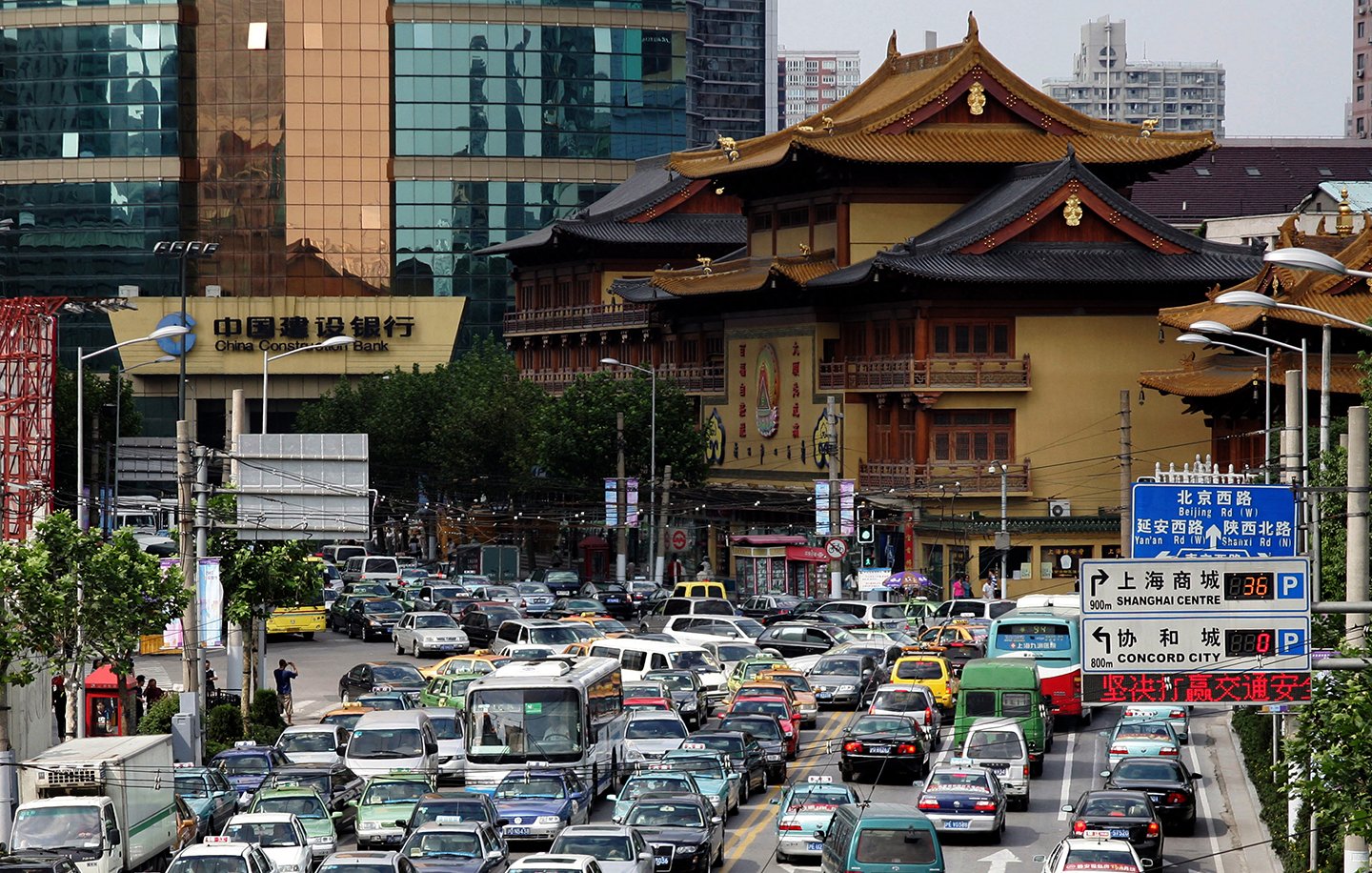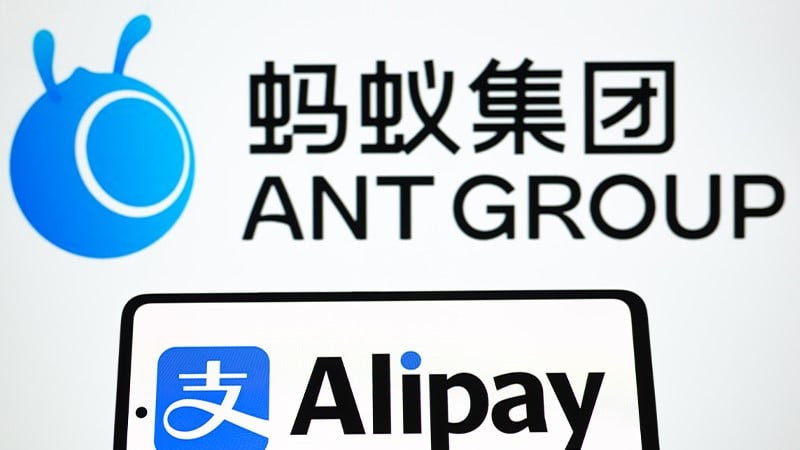Why China’s edge in key industries looks set to last
Lawrence Burns – Deputy manager, Scottish Mortgage
Key Points
- Scottish Mortgage’s Lawrence Burns shares the progress in electric vehicles and drone delivery on display when he was visiting companies in China
- Government support has enabled companies such as BYD, NIO and Meituan to build an impregnable advantage and set the global pace
- China’s scale, industrial policies and entrepreneurial culture mean that the possibility for exceptional upside remain

As with any investment, your capital is at risk.
The moment I left the airport and travelled along the busy highway into Shanghai, something struck me as different.
I had become accustomed to seeing more electric vehicles in cities across the world, but here I found myself surrounded by them.
In Shanghai, this is far from unusual. Half of all new cars sold in the city are electric. Across China, a total of 6.8 million electric vehicles (EVs) were sold last year alone. That’s over 60 per cent of the total sold globally and dwarfs the less than a million sold in the US.
When meeting managers at BYD, a leading EV maker, they told me they expected 90 per cent of new cars sold in China to be electric within five years.
China is therefore on a clear path to being the first major economy to make the EV transition.
Crucially, this is a homegrown transition. While the Chinese automotive market has long been dominated by foreign brands, in EVs it is local brands that dominate, with a commanding market share of over 80 per cent.
China is already the world’s leading EV manufacturer and likely to become the global automotive leader. In the words of Ford’s CEO Jim Farley, “It’s a bit of a new world order”.
Seizing new opportunities
None of this has happened overnight. It is the result of industrial policies dating back to the turn of the millennium.
China understood that with cars that use internal combustion engines, it would always be playing catch-up with the Germans, Americans and Japanese, who had been perfecting the technology for decades.
EVs offered a reset, a level playing field and an opportunity to leapfrog.
The government supported the industry’s development with large procurement contracts to build electric buses, allowing EV and battery manufacturers to build scale and accumulate experience. It then poured in over $30bn of subsidies to nurture the electric passenger car market while giving preferential access to highly sought-after new urban licence plates.
The advantages that China has built up will be hard to overcome. It dominates the EV supply chain with three-quarters of the world’s battery manufacturing capacity and is home to the world’s two largest battery manufacturers, CATL and BYD.
CATL’s co-founder Li Ping told Tom Slater and me over dinner that it now has a research and development budget double that of the rest of the battery industry put together.
China also controls the supply chain for battery components and is home to half the world’s processing and refining of essential raw materials for electric vehicles, such as lithium, cobalt and graphite.
A winning combination
The combination of economies of scale, supply chain domination, accumulated battery experience and lower labour costs now confers a significant cost advantage on China’s EV makers.
William Li, the founder of our holding NIO, a premium Chinese electric car company, believes this cost advantage is about 20 per cent.
For this reason, Tesla now produces over half of its cars at its Shanghai factory. The west will need companies like European battery manufacturer Northvolt to succeed to avoid total dependence on this supply chain.

Yet it is not just cost where China is showing leadership. Innovation is plentiful.
NIO has built a battery swapping network allowing customers to swap for a fully charged or longer-range battery depending on need. The car drives itself into the swap station and, without human intervention, the battery is taken out of the car and replaced in a matter of minutes.
NIO also has a popular AI-powered in-car assistant that can provide directions, play music, change the temperature, take that much-needed in-car selfie or tell you off when you are not paying enough attention to the road.
Expanding horizons
The aim of many of the Chinese EV companies is now to go overseas. NIO is expanding further into Europe, arriving in the UK next year. It even has a new brand called Firefly designed specifically for the European consumer.
If Chinese automotive domination of Europe sounds farfetched, then consider that the second best-selling electric car in the UK is the MG4 made by Chinese state-owned enterprise SAIC.
Top Gear and others have greeted it with rave reviews. The real challengers for Tesla therefore seem highly unlikely to be Ford, Toyota, or Volkswagen but Chinese electric vehicle makers.
However, electric cars were not the only radical change at nearly unimaginable scale I encountered during two weeks in China.
I could have talked about how China is expected to build 150GW of solar capacity this year. That’s greater than the entire installed capacity of the US.
Alternatively, I could have talked about my surprise that another holding, food delivery company Meituan, made over 100,000 drone deliveries in Shenzhen alone last year.
The joy of ordering everything from breakfast to dinner to a refreshing iced tea delivered across the urban sky was made to seem almost mundane.
Recognising the challenges
Despite this awe-inspiring progress, it would be wrong to deny that investing in China has become much harder. The geopolitical risks are genuine and complex.
Our assumption is that Sino-US relations will be characterised by chronic tensions. There is at least good reason to try to keep these tensions in check.
For the US and China, the cost of not doing so is not mutually assured destruction but rather mutually assured stagflation – slow growth, high unemployment, rising prices – should there be a true decoupling and fracturing of global supply chains.
The Taiwan Strait is the obvious flashpoint, but it would require a significant change in the military capabilities of the US or China for either side to believe anything but the most pyrrhic of military victories would be possible. Accidents and miscalculations are the real risk, at least for now.
China’s regulatory environment also presents its own challenges. We need to be open that Scottish Mortgage has not navigated these as well as we should have. The pandemic limited access, and we relied on too narrow a set of corporate leaders for insight.
New leadership, new optimism
This trip, our first since the pandemic, allowed us to meet a wide range of knowledgeable contacts.
The message received was one of optimism. A leading economist noted that the government knew it made mistakes in its handling of the regulatory clampdown, but we should not expect it to admit that.
Multiple company founders noted “a massive sea change” with the appointment of the new premier, Li Qiang.
In China, the premier traditionally manages the economy, but his predecessor Li Keqiang was a former rival of President Xi. This made coordinating policy difficult as Li Keqiang was seen by regulators as speaking without the authority of the president. The drive to promote growth therefore could be safely ignored.
Now, we were told by multiple founders, Li Qiang, a Xi protégé, can push through a pro-growth, pro-business agenda with ease.
Shortly after our visit, Li Qiang referred to consumer internet companies as the “trailblazers of the era”, while the government signalled the end of a period of ‘rectification’ for financial technology companies, including our holdings Ant Group and Tencent.
There will still be regulatory issues in the future but all those we met seemed to agree that the situation was now much better.

Extraordinary potential
Geopolitical and regulatory risks need to be factored into our analysis and valuations of companies. The result has been that we have further raised our bar for investing in China.
Investments in China must offer the possibility of truly exceptional upside to compensate our shareholders for the risks incurred.
This reassessment has driven reductions in our investments in China over the last year. However, given that China is a continent-sized country with bold industrial policies and an ambitious entrepreneurial culture, the possibility for extraordinary firms to emerge still seems entirely plausible.
Last year was a good reminder of this as, despite the negative China headlines, Scottish Mortgage’s best-performing holding hailed from there in the form of ecommerce company Pinduoduo. Many readers may be getting to know the company through its international version Temu, which is currently dominating app downloads across the world.
The future will always be uncertain, but I am convinced that any attempt to understand the world without trying to understand China is doomed to failure. There is still much we need to observe and learn from the world’s second-largest economy and its ambitious and innovative companies.
About the author - Lawrence Burns
Deputy manager, Scottish Mortgage
Lawrence Burns was appointed deputy manager of Scottish Mortgage in 2021. He joined Baillie Gifford in 2009 and became a partner of the firm in 2020. During his time at the firm, his investment interest has become focused on transformative growth companies. He has been a member of the International Growth Portfolio Construction Group since October 2012 and in 2020 became a manager of Vanguard’s International Growth Fund. Lawrence is also co-manager of the International Concentrated Growth and Global Outliers strategies. Prior to this, he also worked in both the Emerging Markets and UK Equity teams. Lawrence graduated BA in Geography from the University of Cambridge in 2009.
Regulatory Information
This content was produced and approved at the time stated and may not have been updated subsequently. It represents views held at the time of production and may not reflect current thinking. Read our Legal and regulatory information for further details.
A Key Information Document is available by visiting our Documents page. Any images used in this content are for illustrative purposes only.
This content does not constitute, and is not subject to the protections afforded to, independent research. Baillie Gifford and its staff may have dealt in the investments concerned. The views expressed are not statements of fact and should not be considered as advice or a recommendation to buy, sell or hold a particular investment.
Baillie Gifford & Co and Baillie Gifford & Co Limited are authorised and regulated by the Financial Conduct Authority (FCA). The investment trusts managed by Baillie Gifford & Co Limited are listed on the London Stock Exchange and are not authorised or regulated by the FCA.
Baillie Gifford Asia (Hong Kong) Limited 柏基亞洲(香港)有限公司 (BGA) holds a Type 1 licence from the Securities and Futures Commission of Hong Kong to market and distribute Baillie Gifford’s range of collective investment schemes and closed-ended funds such as investment trusts to professional investors in Hong Kong.
Baillie Gifford Asia (Singapore) Private Limited (BGAS) is regulated by the Monetary Authority of Singapore as a holder of a capital markets services licence to conduct fund management activities for institutional investors and accredited investors in Singapore. BGA and BGAS are wholly owned subsidiaries of Baillie Gifford Overseas Limited, which is wholly owned by Baillie Gifford & Co.
Europe
Scottish Mortgage Investment Trust PLC (the “Company”) is an alternative investment fund for the purpose of Directive 2011/61/EU (the “AIFM Directive”). Baillie Gifford & Co Limited is the alternative investment fund manager (“AIFM”) of the Company and has been authorised for marketing to Professional Investors in this jurisdiction.
This content is made available by Baillie Gifford Investment Management (Europe) Limited (“BGE”), which has been engaged by the AIFM to carry out promotional activities relating to the Company. BGE is authorised by the Central Bank of Ireland as an AIFM under the AIFM Regulations and as a UCITS management company under the UCITS Regulation. BGE also has regulatory permissions to perform promotional, advisory and Individual Portfolio Management activities. BGE has passported its authorisations under the mechanisms set out in the AIFM Directive.
Belgium
The Company has not been and will not be registered with the Belgian Financial Services and Markets Authority (Autoriteit voor Financiële Diensten en Markten / Autorité des services et marchés financiers) (the FSMA) as a public foreign alternative collective investment scheme under Article 259 of the Belgian Law of 19 April 2014 on alternative collective investment institutions and their managers (the Law of 19 April 2014). The shares in the Company will be marketed in Belgium to professional investors within the meaning the Law of 19 April 2014 only. Any offering material relating to the offering has not been, and will not be, approved by the FSMA pursuant to the Belgian laws and regulations applicable to the public offering of securities. Accordingly, this offering as well as any documents and materials relating to the offering may not be advertised, offered or distributed in any other way, directly or indirectly, to any other person located and/or resident in Belgium other than to professional investors within the meaning the Law of 19 April 2014 and in circumstances which do not constitute an offer to the public pursuant to the Law of 19 April 2014. The shares offered by the Company shall not, whether directly or indirectly, be marketed, offered, sold, transferred or delivered in Belgium to any individual or legal entity other than to professional investors within the meaning the Law of 19 April 2014 or than to investors having a minimum investment of at least EUR 250,000 per investor.
Germany
The Trust has not offered or placed and will not offer or place or sell, directly or indirectly, units/shares to retail investors or semi-professional investors in Germany, i.e. investors which do not qualify as professional investors as defined in sec. 1 (19) no. 32 German Investment Code (Kapitalanlagegesetzbuch – KAGB) and has not distributed and will not distribute or cause to be distributed to such retail or semi-professional investor in Germany, this document or any other offering material relating to the units/shares of the Trust and that such offers, placements, sales and distributions have been and will be made in Germany only to professional investors within the meaning of sec. 1 (19) no. 32 German Investment Code (Kapitalanlagegesetzbuch – KAGB).
Luxembourg
Units/shares/interests of the Trust may only be offered or sold in the Grand Duchy of Luxembourg (Luxembourg) to professional investors within the meaning of Luxembourg act by the act of 12 July 2013 on alternative investment fund managers (the AIFM Act). This document does not constitute an offer, an invitation or a solicitation for any investment or subscription for the units/shares/interests of the Trust by retail investors in Luxembourg. Any person who is in possession of this document is hereby notified that no action has or will be taken that would allow a direct or indirect offering or placement of the units/shares/interests of the Trust to retail investors in Luxembourg.
Switzerland
The Trust has not been approved by the Swiss Financial Market Supervisory Authority (“FINMA”) for offering to non-qualified investors pursuant to Art. 120 para. 1 of the Swiss Federal Act on Collective Investment Schemes of 23 June 2006, as amended (“CISA”). Accordingly, the interests in the Trust may only be offered or advertised, and this document may only be made available, in Switzerland to qualified investors within the meaning of CISA. Investors in the Trust do not benefit from the specific investor protection provided by CISA and the supervision by the FINMA in connection with the approval for offering.
Singapore
This content has not been registered as a prospectus with the Monetary Authority of Singapore. Accordingly, this content and any other content or material in connection with the offer or sale, or invitation for subscription or purchase, of the Trust may not be circulated or distributed, nor may be offered or sold, or be made the subject of an invitation for subscription or purchase, whether directly or indirectly, to persons in Singapore other than (i) to an institutional investor (as defined in Section 4A of the Securities and Futures Act 2001, as modified or amended from time to time (SFA)) pursuant to Section 274 of the SFA, (ii) to a relevant person (as defined in Section 275(2) of the SFA) pursuant to Section 275(1), or any person pursuant to Section 275(1A), and in accordance with the conditions specified in Section 275 of the SFA, or (iii) otherwise pursuant to, and in accordance with the conditions of, any other applicable provision of the SFA.
Where the Trust is subscribed or purchased under Section 275 by a relevant person which is:
(a) a corporation (which is not an accredited investor (as defined in Section 4A of the SFA)) the sole business of which is to hold investments and the entire share capital of which is owned by one or more individuals, each of whom is an accredited investor; or
(b) a trust (where the trustee is not an accredited investor) whose sole purpose is to hold investments and each beneficiary of the trust is an individual who is an accredited investor, securities or securities-based derivatives contracts (each term as defined in Section 2(1) of the SFA) of that corporation or the beneficiaries’ rights and interest (howsoever described) in that trust shall not be transferred within six months after that corporation or that trust has acquired the securities pursuant to an offer made under Section 275 except:
(1) to an institutional investor or to a relevant person or to any person arising from an offer referred to in Section 275(1A) or Section 276(4)(c)(ii) of the SFA,
(2) where no consideration is or will be given for the transfer;
(3) where the transfer is by operation of law; or
(4) pursuant to Section 276(7) of the SFA or Regulation 37A of the Securities and Futures (Offers of Investments) (Securities and Securities-based Derivatives Contracts) Regulations 2018.


